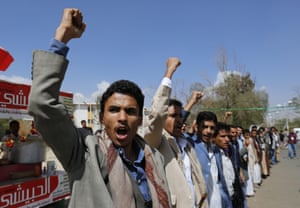Saudi Arabia to scale back Yemen attacks as airstrike death toll rises
Toll in raid on market in Houthi area by US-backed, Saudi-led coalition rises to 119, including 22 children
Saudi Arabia has said its military coalition will scale down operations in Yemen as the death toll from an alliance airstrike on a market north of the Yemeni capital, Sana’a, this week nearly doubled to 119.
A United Nations official said 22 children were among those killed on Tuesday in Hajja province, controlled by Yemen’s Shia Houthi rebels, in the latest in a series of airstrikes that have killed hundreds of civilians since the Yemen war began.
The conflict pits Shia rebels and military units loyal to a former president against the internationally recognised government, which is largely confined to the southern city of Aden. The fighting has killed more than 6,200 civilians, displaced millions and pushed the Arab world’s poorest country to the brink of famine.
The US-backed, Saudi-led coalition of mostly Arab states intervened militarily a year ago, launching airstrikes in support of the internationally recognised government, then sending in elite forces, mostly from Gulf Arab states, in an effort to roll back rebel gains.
The Houthis seized the Yemeni capital of Sana’a in 2014 and later swept across much of the country.
Saudi military spokesman Brigadier General Ahmed al-Asiri told Associated Press that his country and its partners would continue to provide air support to Yemeni forces battling the Houthis and their allies.
“The aim of the coalition is to create a strong, cohesive government with a strong national army and security forces that can combat terrorism and impose law and order across the country,” Asiri said.
Only “small” teams of coalition troops would remain on the ground to “equip, train, and advise” Yemeni forces, which were gradually replacing coalition forces, he said, adding that the coalition’s primary task would now be to help build a Yemeni army.
“This takes time and it needs patience,” he said.
Scaling down military operations, however, would not impact on the size of coalition naval and air assets deployed to protect Yemen’s porous coastline on the Red Sea and the Arabian Sea, he stressed.
Meanwhile, Meritxell Relaño, Unicef’s deputy representative in Yemen, said the revised death toll from Tuesday’s strike on the market in Hajja was almost double the 65 initially reported.
The airstrike in the Houthi-controlled town of Mastaba also wounded 47 people, she said, and warned the death toll could rise further.
The attack on the market was the second deadliest in Yemen since Saudi-led airstrikes began, after a wedding party was hit in September, killing at least 131 people.


No comments:
Post a Comment